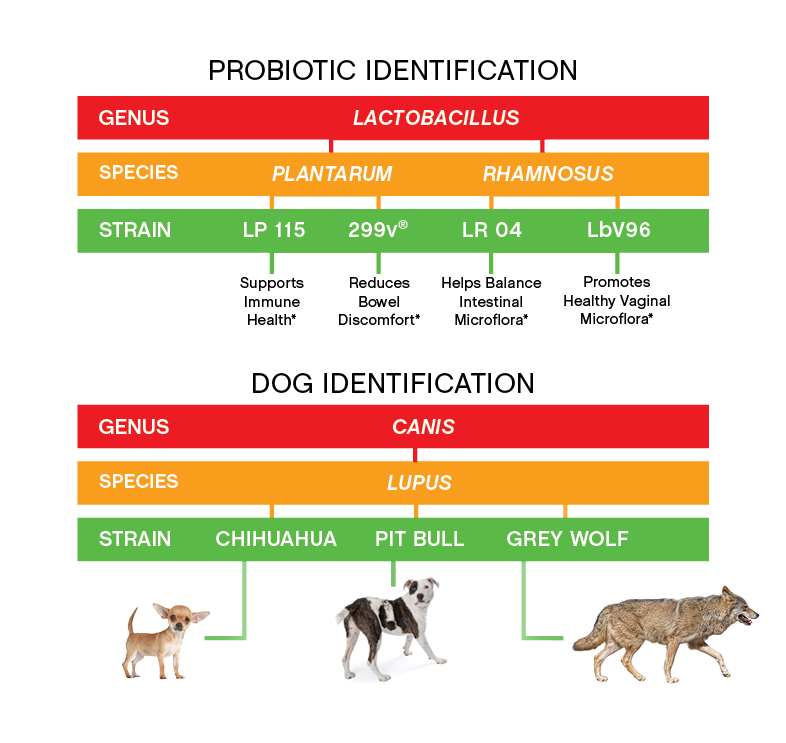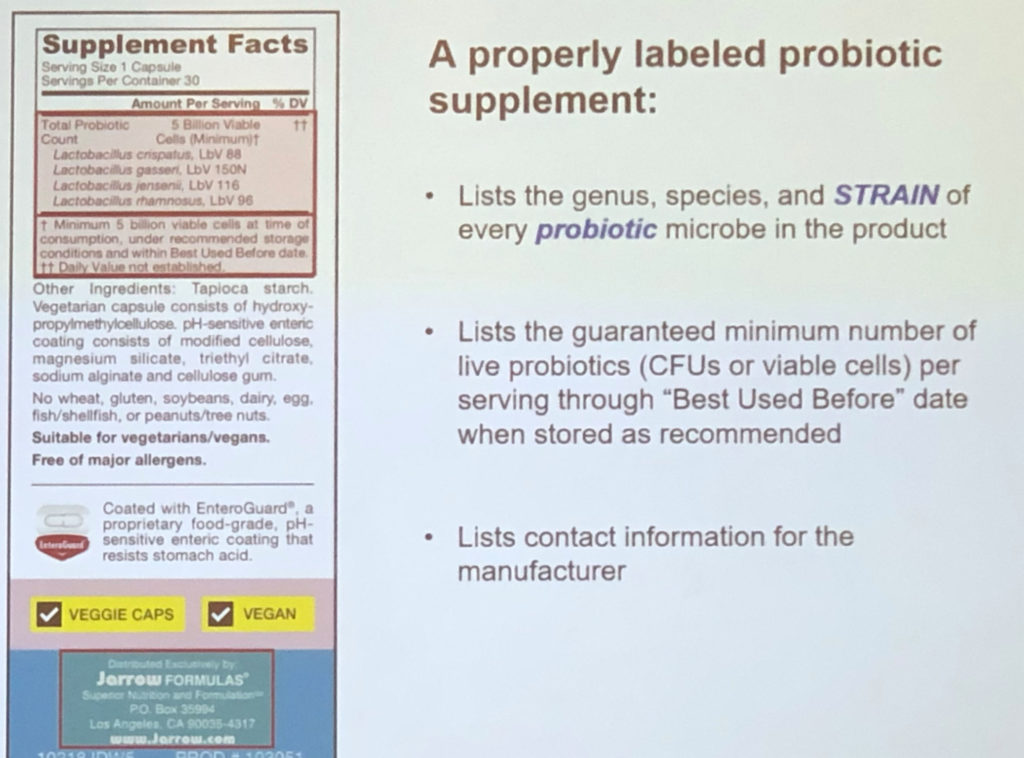How to Pick the Best Probiotic
A reader asked about choosing a probiotic supplement, so I went straight to an expert to learn what makes the best probiotic supplement.
Q: I want to take a probiotic supplement for better health. How do I know which are the better and stronger strains?
To me, this question is like asking what’s the best form of transportation. It depends on a bunch of things. The best probiotic (or means of transportation) in one situation is certainly not the best in another. And the best option today might not be a good choice next year.

Anthony Thomas
To be certain that we have a solid answer, I interviewed Anthony Thomas, PhD, director of scientific affairs at Jarrow Formulas. I recently met Anthony at a conference in which Jarrow Formulas sponsored a session. Anthony was the speaker, and I knew right away that he had the answers my readers wanted.
Trillions of bacteria set up home throughout our bodies. Most reside in our large intestines. Some of these guys do good while others do harm. If the balance of various types of microbes is thrown off, probiotics might help. Check out How To Throw a Dinner Party for Your Gut Bacteria, and scroll down a bit to see What are Probiotics?
Jill: Selecting a probiotic seems more complicated than buying a new car. What should people consider when looking for a probiotic?
Anthony: When selecting a probiotic, it’s critical to first identify why you’re taking it. It’s well recognized scientifically that the benefits of probiotics are specific to the strain, dose and condition, such as supporting immune function or women’s vaginal and urinary tract health.
People commonly ask for the strongest strains of probiotics, but that’s not a question that has an easy answer. More importantly, we need to ask which strains of probiotics have research to support their use for your specific concern. For example, are you looking to relieve digestive problems, or discourage vaginal yeast overgrowth or do you want a probiotic for something else entirely? Your answer helps determine the best option for you. Rarely are products interchangeable.
Given the plethora of commercial products available claiming to contain probiotics that support immune function, for example, I think it is first important to verify that the product contains genuine probiotic strains that have been shown in clinical research to support immune function and health.
Jill: So, what then should consumers look for on labels?
Anthony: An accurate strain designation is typically a combination of letters and numbers listed after the microbial genus and species. You might see something that looks like this: Lactobacillus rhamnosus R0011.
Even more commonly, you’ll see L. rhamnosus R0011.
All three elements need to be identified. Otherwise, you have no way of knowing what exactly is in your probiotic food or supplement, or if there is research to substantiate the organism as a true probiotic.
- GENUS: Lactobacillus
- SPECIES: rhamnosus
- STRAIN: R0011

Thanks to Jarrow Formulas for sharing this terrific graphic
Jill: Do all yogurt brands have probiotics?
Anthony: No. Not unless they have been added to the yogurt and are present in adequate amounts at time of consumption. By definition, a probiotic must be alive when you swallow it, and not all yogurts have this, especially if not transported and stored with care and consumed before the best buy date. Additionally, just because a yogurt has live bacteria doesn’t mean the genus, species and strain is the one that has the effects that you are looking for.
How to pick a probiotic supplement. The label should include these things.Click To TweetJill: This is getting very complicated. Can you share an example of a yogurt in the supermarket?
Anthony: The brand Nancy’s offers a number of probiotic yogurts that claim to support immune health. In addition to the yogurt starter cultures, these yogurts contain specific probiotic strains, such as Bifidobacterium lactis BB-12 and Lactobacillus rhamnosus LB3, that actually do have research to support immune function, hence substantiate the claim of support for immune health.

Choosing a probiotic supplement. This slide is from Anthony’s sponsored talk at a recent nutrition conference.
Jill: Since specific strains are appropriate for specific conditions only, how can consumers find out what they should take for their problems?
Anthony: Currently, there is no comprehensive guide to evidence-based recommendations for probiotics. But there is a clinical guide to probiotics available in the US that’s useful. You’ll find it at usprobioticguide, and it’s also available as an app. This is a nice resource for both healthcare practitioners and consumers to guide evidence-based usage recommendations of probiotics for a given health indication. The references to the research are also provided. There’s a similar guide for products available in Canada.
Jill: I’m picking up from this conversation that consumers have homework when it comes to selecting a probiotic.
Anthony: Yes! There is no one-size-fits-all for probiotics, and many products are marketed for a variety of health indications, but lack research to support their marketing claims. I encourage consumers to discuss their needs with their healthcare providers. A healthcare provider can help you pick a product that has documented research to support the claims.
Don't randomly pick a probiotic supplement. Picking the wrong one is like taking a vitamin C supplement when you really need vitamin D.Click To TweetJill: Do you have any red flags to share?
Anthony: Not having much information about the manufacturer on the packaging is a red flag. The manufacture’s contact information should be available. Or at least, a website should be listed, and full contact information should be on the website. You should have a resource listed, so you can request more information, including research to support the product claims.
Another red flag is a product that claims live probiotics “at the time of manufacture,” which is often listed in small print. Steer clear of these. This purposely misleads consumers, as it inflates the quantity listed on the label and does not represent the number of live probiotics in the product at the time of administration. By definition, a probiotic must be alive and provide adequate amounts to realize a health benefit at time of administration – at the time that you consume it.
Jill: How long does someone need to take a probiotic supplement?
Anthony: If you’re taking a probiotic for a chronic health condition or for the prevention of a health problem, you’ll need to take your probiotic long term. That’s because administered probiotics don’t sustainably colonize the adult gut.
Jill: They’re just visiting?
Anthony: Yes. They’re temporary residents that interact with the microbial community and host cells during their transient stay and in transit through the gut.
Jill: Are the probiotic supplements that require refrigeration better than shelf-stable supplements?
Anthony: No. The efficacy of probiotic supplements is inherent to the strain(s) used and quality of manufacturing. However, increasing temperatures generally have a negative impact on viability and functionality of probiotics over time. It’s a good idea to refrigerate probiotics whether the product claims to be shelf stable or not.
Bottom line: Probiotics can be quite beneficial. Do your homework to find out which products contain the strains with research to support the specific effect you are looking for. Just like taking a vitamin C supplement when you really need vitamin D won’t help, taking the wrong probiotic product won’t help you either. This is true even if it helped your friend with a different health concern. Finally, store the product properly, and consume it by the “Best Used Before Date.”
For more information, check out the International Probiotic Association (IPA), the International Scientific Association of Probiotics and Prebiotics (ISAPP), and jarrowprobiotics.com. And for a brief discussion about fermented foods and probiotics, take a look at the National Dairy Council website.
More about Anthony: Anthony Thomas, PhD is the director of scientific affairs at Jarrow Formulas. He evaluates and manages research activities related to product formulation, including dosing and usage recommendations to reflect scientifically supported benefits for health and product use in clinical studies. His primary research interests have focused on the influence of dietary and lifestyle factors on the pathogenesis of several disease states. Anthony has authored and co-authored multiple peer reviewed scientific manuscripts and served as a referee with relevant expertise of nutrition for multiple scientific journals.
Filed Under: Nutrition, Science of Healthy
Tagged: probiotics, reader question, yogurt
Jill Weisenberger
I'm Jill, and I believe simple changes in your mindset and health habits can bring life-changing rewards. And I don't believe in willpower. It's waaaay overrated. As a food-loving registered dietitian nutritionist, certified diabetes care and education specialist and certified health and wellness coach, I've helped thousands of people solve their food and nutrition problems. If you're looking for a better way to master this whole healthy eating/healthy living thing or if you're trying to prevent or manage diabetes or heart problems, you'll find plenty of resources right here.
Leave a Reply
Welcome to my Blog
Hi there! I'm Jill, a nutrition & diabetes expert and the author of 4 books.

I believe simple changes in health habits can bring you life-changing rewards.
And I believe willpower is way overrated.
Right here is where you can discover the mindset and habits to stick with healthy lifestyle choices most of the time - and drop the guilt when you don't.
Get the Second Edition!

Featured Posts









